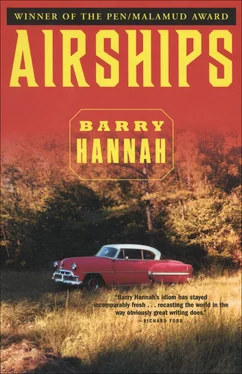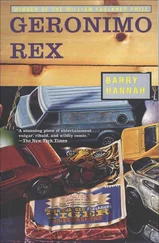Barry Hannah - Airships
Здесь есть возможность читать онлайн «Barry Hannah - Airships» весь текст электронной книги совершенно бесплатно (целиком полную версию без сокращений). В некоторых случаях можно слушать аудио, скачать через торрент в формате fb2 и присутствует краткое содержание. Год выпуска: 2007, Издательство: Grove Press, Жанр: Современная проза, на английском языке. Описание произведения, (предисловие) а так же отзывы посетителей доступны на портале библиотеки ЛибКат.
- Название:Airships
- Автор:
- Издательство:Grove Press
- Жанр:
- Год:2007
- ISBN:нет данных
- Рейтинг книги:3 / 5. Голосов: 1
-
Избранное:Добавить в избранное
- Отзывы:
-
Ваша оценка:
- 60
- 1
- 2
- 3
- 4
- 5
Airships: краткое содержание, описание и аннотация
Предлагаем к чтению аннотацию, описание, краткое содержание или предисловие (зависит от того, что написал сам автор книги «Airships»). Если вы не нашли необходимую информацию о книге — напишите в комментариях, мы постараемся отыскать её.
Airships — читать онлайн бесплатно полную книгу (весь текст) целиком
Ниже представлен текст книги, разбитый по страницам. Система сохранения места последней прочитанной страницы, позволяет с удобством читать онлайн бесплатно книгу «Airships», без необходимости каждый раз заново искать на чём Вы остановились. Поставьте закладку, и сможете в любой момент перейти на страницу, на которой закончили чтение.
Интервал:
Закладка:
Because by that time Word had taken French Edward over and made him quite a tennis player. French could beat Baby Levaster and all the college aces. At eighteen, he was a large angel-bodied tyrant of the court, who drove tennis balls through, outside, beyond and over the reach of any challenger Dr. Word could dig up. The only one who could give French Edward a match was Word himself, who was sixty and could run and knew the few faults French had, such as disbelieving Dr. Word could keep racing after the balls and knocking them back, French then knocking the odd ball ten feet out of court in an expression of sheer wonder. Furthermore, French had a tendency to soft-serve players he disliked, perhaps an unthinking gesture of derision or perhaps a self-inflicted handicap, to punish himself for ill will. For French’s love of the game was so intense he did not want it fouled by personal uglinesses. He had never liked Dr. Word, even as he learned from him. He had never liked Word’s closeness, nor his manufactured British or Boston accent, nor the zeal of his interest in him, which French supposed surpassed that of mere coach. For instance, Dr. Word would every now and then give French Edward a pinch , a hard, affectionate little nip of the fingers.
And now French Edward was swollen with hatred of the man, the degree of which had no name. It was expelled on the second day of August, hottest day of the year. He called up Word for a match. Not practice, French said. A match. Dr. Word would have played with him in the rain. At the net, he pinched French as they took the balls out of the can. French knocked his hand away and lost games deliberately to keep the match going. Word glowed with a perilous self-congratulation for staying in there; French had fooled Word into thinking he was playing even with him. French pretended to fail in the heat, knocking slow balls from corner to corner, easing over a drop shot to watch the old man ramble up for it. French himself was tiring in the disguise of his ruse when the old devil keeled over, falling out in the alley with his racket clattering away. Dr. Word did not move, though the concrete must have been burning him. French had hoped for a heart attack. Word mumbled that he was cold and couldn’t see anything. He asked French to get help.
“No. Buck up. Run it out. Nothing wrong with you,” said French.
“Is that you, French, my son?”
“I ain’t your son. You might treat my mother like I was, but I ain’t. I saw you.”
“A doctor. Out of the cold. I need medical help,” Dr. Word said.
“I got another idea. Why don’t you kick the bucket?”
“Help.”
“Go on. Die. It’s easy.”
When French got home, he discovered his mother escaping the heat in a tub of cold water. Their house was an unprosperous and unlevel connection of boxes. No door of any room shut properly. He heard her sloshing the water on herself. His father was up at Dick Lee’s grocery watching the Cardinals on the television. French walked in on her. Her body lay underwater up to her neck.
“Your romance has been terminated,” he said.
“French?” She grabbed a towel off the rack and pulled it in the water over her.
“He’s blind. He can’t even find his way to the house anymore.”
“This was a sin, you to look at me!” Mrs. Edward cried.
“Maybe so,” French said, “but I’ve looked before, when you had company.”
French left home for Baton Rouge, on the bounty of the scholarship Dr. Word had hustled for him through the athletic department at Louisiana State. French swore never to return. His father was a fool, his mother a lewd traitor, his mentor a snake from the blind side, the river a brown ditch of bile, his town a hill range of ashes and gloomy souvenirs of the Great Moment in Vicksburg. His days at college were numbered. Like that of most natural athletes, half French Edward’s mind was taken over by a sort of tidal barbarous desert where men ran and struggled, grappling, hitting, cursing as some fell into the sands of defeat. The only professor he liked was one who spoke of “muscular thought.” The professor said he was sick and tired of thought that sat on its ass and vapored around the room for the benefit of limp-wrists and their whiskey.
As for Dr. Word, he stumbled from clinic to clinic, guided by his brother Wilbur, veteran of Korea and colossal military boredoms all over the globe, before resettling in Vicksburg on the avant-garde of ennui.
Baby Levaster saw the pair in Charity Hospital when he was a med student at Tulane. Word’s arm was still curled up with stroke and he had only a sort of quarter vision in one eye. His voice was frightful, like that of a man in a cave of wasps. Levaster was stunned by seeing Dr. Word in New Orleans. He hid in a closet, but Word had already recognized him. Brother Wilbur flung the door open, illuminating Levaster demurring under a bale of puke sheets.
“Our boy won the Southern!” shouted Word. “He’s the real thing, more than I ever thought!”
“Who are you talking about?” said Baby Levaster. The volume of the man had blown Levaster’s eyebrows out of order.
“Well, French! French Edward! He won the Southern tournament in Mobile!”
Levaster looked to Wilbur for some mediator in this loudness. Wilbur cut away to the water fountain. He acted deaf.
“And the Davis Cup!” Word screamed. “He held up America in the Davis Cup! Don’t you read the papers? Then he went to Wimbledon!”
“French went to Wimbledon?”
“Yes! Made the quarterfinals!”
A nurse and a man in white came up to crush the noise from Word. Levaster went back into the closet and shut the door. Then he peeped out, seeing Word and his brother small in the corridor, Word limping slightly to the left, proceeding with a roll and capitulation. The stroke had wrecked him from brain to ankles, had fouled the centers that prevent screaming. Levaster heard Word bleating a quarter mile down the corridor.
Baby Levaster read in the Times-Picayune that French was resident pro at the Metairie Club, that French was representing the club in a tournament. Levaster hated med school. He hated the sight of pain and blood, and by this time he had become a thin, weak, balding drunkard of a very disagreeable order, even to himself. He dragged himself from one peak of cowardice to the next and began wearing sunglasses, and when he saw French Edward fend off Aussie, Wop, Frog, Brit and Hun in defending the pride of the Metairie Club, Levaster’s body left him and was gathered into the body of French. He had never seen anything so handsome as French Edward. He had never before witnessed a man as happy and winsome in his occupation. Edward moved as if certain animal secrets were known to him. He originated a new, dangerous tennis, taking the ball into his racket with a muscular patience; then one heard the sweet crack, heard the singing ball, and hung cold with a little terror at the speed and the smart violent arc it made into the green. French was by then wearing spectacles. His coiled hair, the color of a kind of charred gold, blazed with sweat. On his lips was the charmed smile of the seraphim. Something of the priest and the brute mingled, perhaps warred, in his expression. Baby Levaster, who had no culture, could not place the line of beauty that French Edward descended from, but finally remembered a photograph of the David statue he’d seen in an old encyclopedia. French Edward looked like that.
When French Edward won, Levaster heard a louder, baleful, unclublike bravo from the gallery. It was Dr. Word. Levaster watched Word fight through the crowd toward French. The man was crazed with partisanship. Levaster, wanting to get close to the person of French himself, three-quarters drunk on gin he’d poured into the iced Cokes from the stand, saw Word reach for French’s buttock and give it a pinch. French turned, hate in his eye. He said something quick and corrosive to Word. All the smiles around them turned to straight mouths of concern. Dr. Word looked harmless, a tanned old fellow wearing a beige beret.
Читать дальшеИнтервал:
Закладка:
Похожие книги на «Airships»
Представляем Вашему вниманию похожие книги на «Airships» списком для выбора. Мы отобрали схожую по названию и смыслу литературу в надежде предоставить читателям больше вариантов отыскать новые, интересные, ещё непрочитанные произведения.
Обсуждение, отзывы о книге «Airships» и просто собственные мнения читателей. Оставьте ваши комментарии, напишите, что Вы думаете о произведении, его смысле или главных героях. Укажите что конкретно понравилось, а что нет, и почему Вы так считаете.












